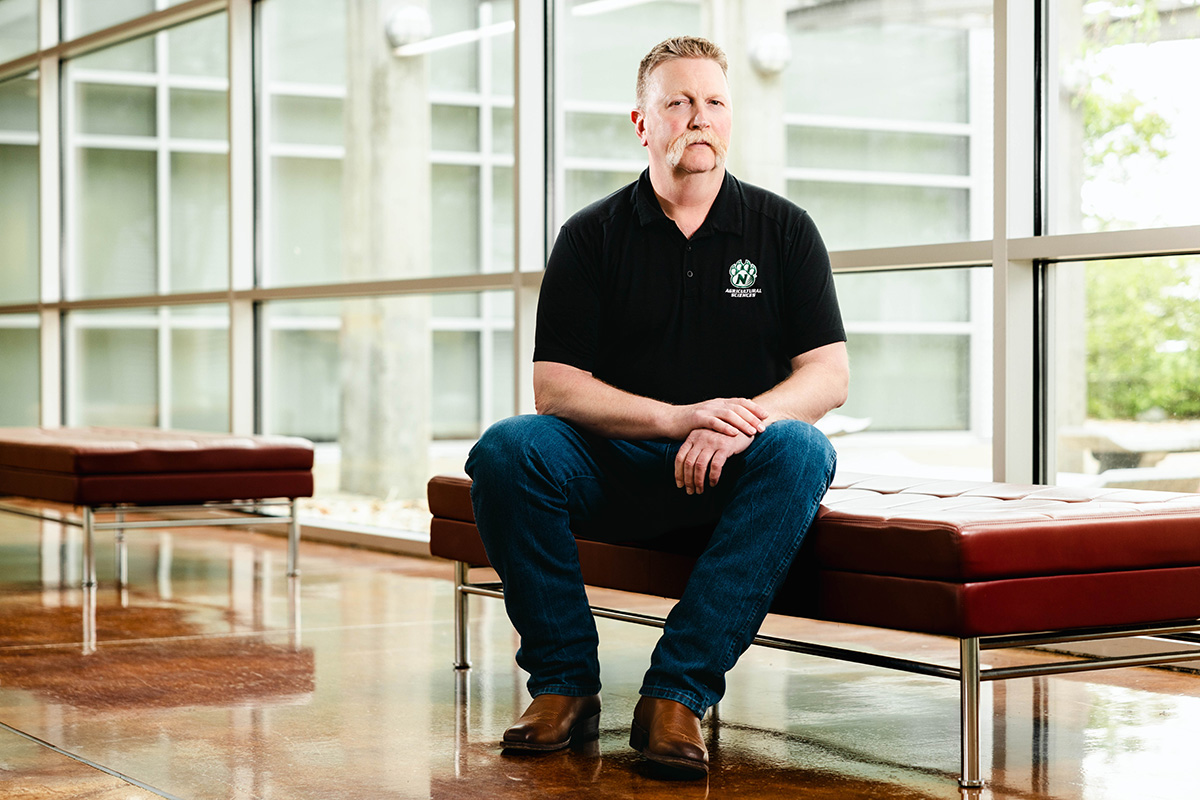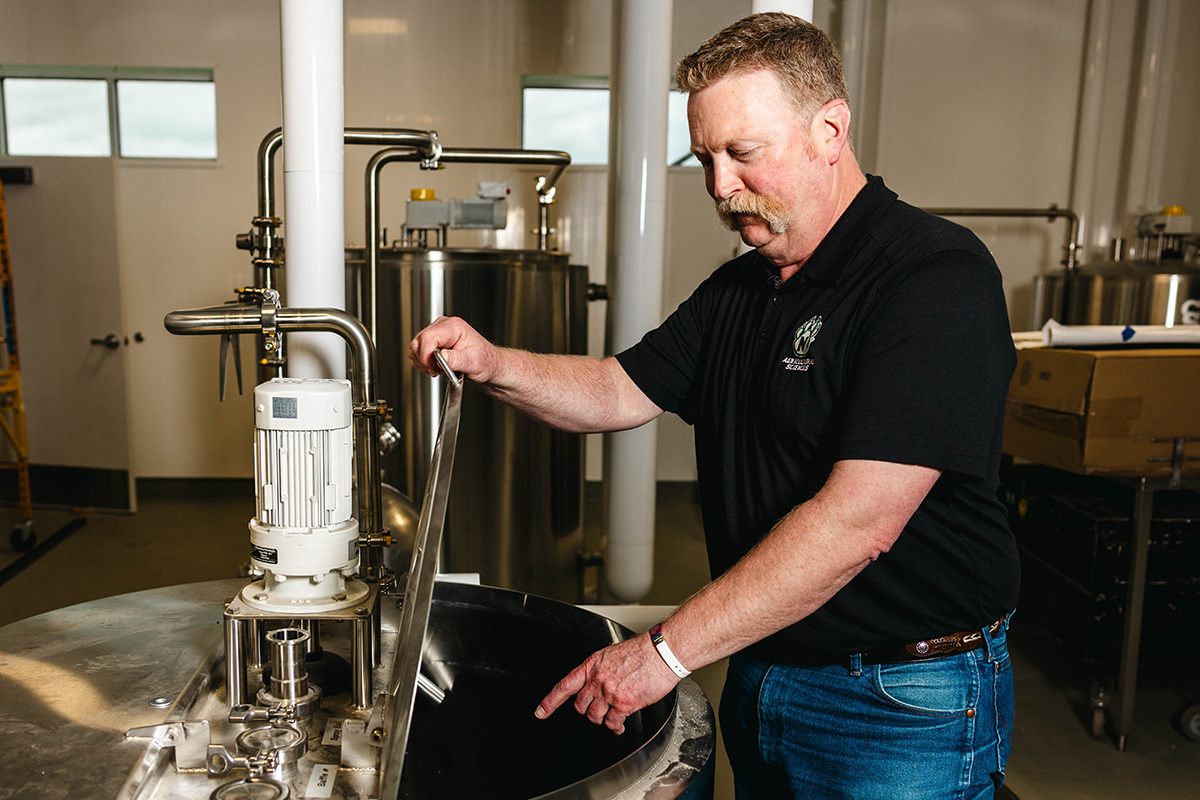
Bill Brooks at the Dean L. Hubbard Center for Innovation, which is the academic home of the School of Agricultural Sciences. (Photo by Lilly Cook/Northwest Missouri State University)
A Northwest Missouri State University alumnus turned faculty member is relying on his dairy knowledge to help bring the University’s creamery to fruition and enhance student opportunities.
Bill Brooks joined the Northwest faculty in 2020 after working in the economic and research side of the dairy industry for over 20 years. Numbers and business operations interested him more than working with cattle.
He teaches coursework in applied futures marketing and agricultural law. Now, as the University moves closer to completing a creamery at Northwest’s Agricultural Learning Center, Brooks will be charged with incorporating his expertise to manage the operation.
“Bill Brooks brings a broad background in the dairy industry from growing up on a dairy farm and spending time in dairy marketing,” Dr. Rod Barr, the director of the School of Agricultural Sciences, said. “He has been an industry leader in dairy marketing so with that background, he is the right person to oversee the creamery operations at Northwest.”
During his undergraduate years at Northwest, Brooks liked the idea of coming back to the University to teach. He appreciated the classroom opportunities and being involved in student organizations that helped build his leadership and networking skills.
He grew up on a dairy farm in Eagleville, Missouri, and decided to attend Northwest due to its affordability and being close to home. He tutored at the Talent Development Center under the leadership of Dr. Patt VanDyke and counts his undergraduate academic advisor, Dr. Duane Jewell, and graduate academic advisor, Dr. Arley Larson, as additional mentors.
After graduating from Northwest in 1991 with a bachelor’s degree in agricultural business, Brooks began his career in the dairy industry and spent several years with the Dairy Farmers of America. He then worked in risk management with INTL FCStone Inc. for more than 10 years and joined the Agricultural Business Council of Kansas City. In 2016, he earned his Master of Business Administration degree in agricultural economics from Northwest.
When a faculty position became available at Northwest, he wasted no time changing paths. Throughout his career, he had remained connected with the University as a member of the Northwest Alumni Association Board of Directors and the Northwest Booster Club. He and his wife, Courtney Krokstrom Brooks, who attended Northwest, contributed to the success of the University’s Forever Green campaign through their financial support of the Carl and Cheryl Hughes Fieldhouse and as Homesteaders for the Agricultural Learning Center. The couple also contributes to the Adopt-A-Bearcat Scholarship and KXCV-KRNW radio.
“The role of an instructor at a university was somewhat appealing to me,” Brooks said. “It was always something I kept in the back of my mind as a potential opportunity.”
After a conversation about the future creamery with Larson, who retired in 2020, Brooks realized he had more dairy experience than other faculty members and wanted to share his passion for the industry with students. However, he needed to improve his teaching skills and learn more – especially about dairy science.
“Teaching is not just about passing on information but helping students build their own understanding and knowledge to help them decide what agricultural career that they want to pursue or achieve their career goals,” Brooks said.
In 2023, Northwest began moving forward with plans to construct a creamery at its Agricultural Learning Center, turning a vision of long-time agriculture faculty into reality. Likewise, Brooks is excited about the possibilities and profession-based opportunities it will provide for students by witnessing the farm-to-table process.
During construction of the creamery, he has stayed busy gaining numerous certifications and learning about dairy processing equipment. He now has certifications in dairy foods manufacturing, value-added dairy foods business and trading by technical analysis.
“The certifications helped me get educated where I can hopefully pass that knowledge on to students,” Brooks said, emphasizing that he likes learning about how things work. He added, “I’m always looking if there’s a way to get a little more knowledge on my own so I will have more tools in my toolbox to help students.”

Bill Brooks is sharing his dairy knowledge to help bring Northwest's creamery to fruition and enhance student opportunities.
When finished, the creamery will provide a wide range of opportunities, including research and food production, safety testing and even the marketing and retail of fluid milk, ice cream and butter. The new venture also opens possibilities for cross-departmental collaboration for students to learn how dairy products are made and even implement graphic design for logos or packaging.
The creamery not only will give students more education opportunities, it also will provide education for the community.
“That just continues to cement the School of Ag’s position within the University, the community and the region as far as an institution that continues to look for additional and innovative ways to educate students so they’re better prepared whenever they get into the working world,” Brooks said.
The small-scale, community-oriented location at the Agricultural Learning Center also makes Northwest’s creamery unique from other universities.
“There’s some neat things going on in the state, but we’re the ones kind of focusing on smaller operation, on-farm processing to see if that’s something that producers are interested in,” Brooks said.
By providing information about food production and the marketing chain, Brooks focuses on teaching the entirety of dairy production rather than segments commonly taught at other institutions.
The support, excitement and inquiries about the project have been a positive revelation.
“We have what can be a massive amount of opportunities from an education standpoint for students to get involved,” Brooks said.